Weitzman ECHO Series for Ohio: Substance Use Disorders (December 2, 2024) - Integrated Care/Team-Based Care: Care Provision Partners
Weitzman ECHO Substance Use Disorders:
Managing Patients with Substance Use Disorders in Primary Care
Program Information
This Weitzman ECHO Series for Ohio connects primary care providers, behavioral health providers, and other care team members to a community of peers and subject matter experts from across Ohio to address patients’ complex health needs related to substance use disorders. The multidisciplinary faculty team applies a trauma-informed, harm-reduction philosophy of care to improve the care of patients with substance use disorders and their health outcomes.
Weitzman ECHO Substance Use Disorders 2024-2025 is the continuing education series' third cohort that includes 20 sessions over a span of 10 months. The series begins Monday, October 7th, 2024, and is offered in collaboration with Buckeye Health Plan and Ohio University at no cost. Each one-hour ECHO session consists of a brief didactic presentation on key topics related to substance use disorders followed by patient case discussions submitted by participating providers.
CME, CNE, CPE, and CEU credits will be provided for physicians, nurse practitioners, nurses, physician associates/assistants, pharmacists, social workers, and psychologists by Moses/Weitzman Health System, Inc., an accredited provider through Joint Accreditation for Interprofessional Continuing Education.
Acknowledgement of Support
This program is supported by Ohio’s Medicaid Managed Care Plans' community reinvestment initiatives through the 2023 Collaborative Medicaid Managed Care Community Reinvestment Fund. This fund is administered by the Ohio Association of Health Plans.
Target Audience
This activity is appropriate for the following audiences:
- Primary care providers (MD, DO, NP, PA)
- Behavioral health providers
- Other members of the care team
Learning Objectives
Upon completion of this activity, participants should be able to do the following:
- Project a harm reduction philosophy of care into your treatment of patients experiencing substance use disorders and explain this concept to peers
- Illustrate trauma-informed practices in the screening, assessment, and treatment of patients experiencing substance use disorders
- Optimize the care of common co-occurring psychiatric and medical conditions in patients experiencing substance use disorders
- [For prescribers] Enhance clinical competence and confidence around medication management for patients with substance use disorders, including alcohol, stimulants, opioid, cannabis, and tobacco.
- [For non-prescribers] Understand the importance and provide support for medication management strategies in patients experiencing substance use disorders, including alcohol, stimulants, opioid, cannabis, and tobacco.
- Use motivational interviewing and other behavioral techniques to improve patient outcomes related to substance use disorders
- Collaborate with community clinical and non-clinical care team members more effectively to improve the management of patients, including those experiencing polysubstance use.
- Distinguish and address factors related to social determinants of health faced by specific populations experiencing substance use disorders
FAQs
What is Project ECHO®? Project ECHO® was developed by Sanjeev Arora, MD, at the University of New Mexico Health Sciences Center and is a collaborative model of medical education and care management that helps improve clinicians' knowledge and skills to improve patient care. ECHOs are designed to be a longer-term continuing education programs to create a virtual community for providers and care team members to connect and learn from leading experts and receive guidance from peers and experts. This ECHO learning community provides mentorship and peer support, making this model unique and providing long-lasting impact beyond typical e-learning styles. Weitzman ECHO clinics are specifically designed to meet the needs of safety net primary care providers and their communities like providers practicing in federally qualified health centers (FQHCs).
How is each ECHO session structured? Each ECHO session consists of a didactic presentation by the ECHO's expert faculty and real patient case discussion presented by participating providers. During each ECHO session, participants learn skills and receive clinical pearls from the expert faculty didactic presentation and the case discussion and recommendations.
How much does it cost to participate? Enrollment is now open at no cost for the next curriculum year.
Who should participate? Primary care medical providers, behavioral health providers, and care team members who work in Ohio (or in an Appalachian region in a bordering state) are welcome to join and register.
When do sessions occur? This Project ECHO will occur twice monthly for one hour. Our kickoff session for our first module will occur on October 7, 2024, and sessions will occur every 1st and 3rd Monday of each month from 12pm to 1pm ET.
What level of participation is expected? Substance Use Disorders ECHO consists of 24 sessions in total. ECHO participants are expected to:
- Attend at least 50% of sessions
- Complete pre- and post- surveys
- Submit at least one case for recommendations
- Share webcams, when available
- Engage during peer case discussion
How do I join the live sessions? Do I need any special equipment? Weitzman ECHO sessions are held virtually using the Weitzman Education Platform and Zoom Video Conferencing. Access is available on any computer with an internet connection. For instruction on how to how to join the live session, follow these Step-by-step instructions: Entering a Live Session.
How do I claim credit and download my CE/CME certificate? After the live session is completed, the session evaluation will be available right in the platform. Once you complete the session evaluation, you will be able to claim your credits and download your certificate.
AMA Designation Statement
Moses/Weitzman Health System Inc. designates this Live activity for a maximum of 20 AMA PRA Category 1 Credit(s)™. Physicians should claim only the credit commensurate with the extent of their participation in the activity.
Schedule
This activity meets the 1st & 2nd Monday of every month from 12-1pm ET. Below are the dates of the sessions:
Module 1: SUD Care Strategies - A Foundation for Primary Care
- October 7, 2024
- October 14, 2024
- November 4, 2024
- November 11, 2024
- December 2, 2024
- December 9, 2024
- January 6, 2025
- January 13, 2025
Module 2: MAT
- February 3, 2025
- February 10, 2025
- March 3, 2025
- March 10, 2025
- April 7, 2025
Module 3: SUD Comorbidities
- April 14, 2025
- May 5, 2025
- May 12, 2025
- June 2, 2025
- June 9, 2025
- July 7, 2025
- July 14, 2025
Faculty
 Mark Hurst, MD has a rich history in the healthcare field. During his career, Hurst has held leadership positions in the private sector, public sector and state government, including as medical director and director of the Ohio Department of Mental Health and Addiction Services and medical director and assistant director of the Ohio Department of Health. In his state positions, he led efforts in suicide prevention, dual diagnosis treatment, trauma informed care, and addressing the opioid crisis. Dr. Hurst is board-certified in psychiatry and addiction psychiatry is a private healthcare consultant and is Clinical Associate Professor of Psychiatry and Behavioral Health at The Ohio State University. He has been recognized by his peers as a "Best Doctor in America" on multiple occasions.
Mark Hurst, MD has a rich history in the healthcare field. During his career, Hurst has held leadership positions in the private sector, public sector and state government, including as medical director and director of the Ohio Department of Mental Health and Addiction Services and medical director and assistant director of the Ohio Department of Health. In his state positions, he led efforts in suicide prevention, dual diagnosis treatment, trauma informed care, and addressing the opioid crisis. Dr. Hurst is board-certified in psychiatry and addiction psychiatry is a private healthcare consultant and is Clinical Associate Professor of Psychiatry and Behavioral Health at The Ohio State University. He has been recognized by his peers as a "Best Doctor in America" on multiple occasions.
 Dana Vallangeon, MD most recently completed over five years at OACHC as the Chief Medical Officer. As CMO, she assisted in efforts to lead health center clinical teams to the highest levels of quality and operational efficiency. Her dual board certification in Family Medicine and Addiction Medicine supported her work with the OACHC Behavioral Health and Quality teams to continue the adoption of effective Substance Use Disorder treatment throughout Ohio’s FQHCs. A former health center CEO and staff physician for over 17 years, she has also been a medical director at a free clinic and at a substance use disorder/mental health treatment facility, along with an ongoing role as an adjunct medical school and Family Medicine residency faculty. She received her M.D. degree from The Ohio State University College of Medicine and her B.S. degree from Olivet Nazarene University.
Dana Vallangeon, MD most recently completed over five years at OACHC as the Chief Medical Officer. As CMO, she assisted in efforts to lead health center clinical teams to the highest levels of quality and operational efficiency. Her dual board certification in Family Medicine and Addiction Medicine supported her work with the OACHC Behavioral Health and Quality teams to continue the adoption of effective Substance Use Disorder treatment throughout Ohio’s FQHCs. A former health center CEO and staff physician for over 17 years, she has also been a medical director at a free clinic and at a substance use disorder/mental health treatment facility, along with an ongoing role as an adjunct medical school and Family Medicine residency faculty. She received her M.D. degree from The Ohio State University College of Medicine and her B.S. degree from Olivet Nazarene University.
 Ericka Ludwig, DHS, LPCC-S, LICDC-CS earned her Bachelor’s Degree in Psychology from Capital University, her Master’s Degree in Clinical Mental Health Counseling from Wright State University, and her Doctorate Degree in Human Services from Capella University. For the last 11 years, Ericka has been employed at Hopewell Health Centers located in the beautiful Hocking Hills, Ohio, providing direct clinical care to clients who have co-occurring mental health and substance use concerns. In her current role as the Outpatient Supervisor/Coordinator of counseling services, she provides both direct care to a small case load of clients as well as provides clinical and administrative supervision of counseling staff. Her passion for this population can be displayed through her involvement in innovative programs addressing rural substance use concerns including the Hocking County Municipal Court Drug Court programs, Rapid Access, Project HOPE, and recovery housing. She was awarded the 2015 Hocking County Mental Health Advocate Award for her leadership on the creation of the county’s first recovery house.
Ericka Ludwig, DHS, LPCC-S, LICDC-CS earned her Bachelor’s Degree in Psychology from Capital University, her Master’s Degree in Clinical Mental Health Counseling from Wright State University, and her Doctorate Degree in Human Services from Capella University. For the last 11 years, Ericka has been employed at Hopewell Health Centers located in the beautiful Hocking Hills, Ohio, providing direct clinical care to clients who have co-occurring mental health and substance use concerns. In her current role as the Outpatient Supervisor/Coordinator of counseling services, she provides both direct care to a small case load of clients as well as provides clinical and administrative supervision of counseling staff. Her passion for this population can be displayed through her involvement in innovative programs addressing rural substance use concerns including the Hocking County Municipal Court Drug Court programs, Rapid Access, Project HOPE, and recovery housing. She was awarded the 2015 Hocking County Mental Health Advocate Award for her leadership on the creation of the county’s first recovery house.

Kate Berenson, MD, FACP, FASAM, graduated from the Wright State Boonshoft School of Medicine and initially pursued psychiatry before transitioning to internal medicine, completing her chief year in 2018 along with an HRSA fellowship in Primary Care Transformations. While her passion for outpatient care remained strong, she developed a keen interest in studying and developing treatments for substance use disorders. The pandemic, unexpectedly, provided her with the opportunity to focus on this area. She completed an addiction fellowship at OhioHealth in 2021 and subsequently established the MAT program at Five Rivers Health Center, a Federally Qualified Health Center (FQHC) in Dayton, Ohio. The program integrates peer support, group therapy, and pharmacotherapy to address the full spectrum of substance use disorders, while also incorporating primary care and infectious disease management, including Hepatitis C treatment, to provide holistic care. She is pleased to contribute her insights and evidence-based perspectives to the Weitzman ECHO series.
Weitzman Institute Disclosure Statement
It is the policy of the Weitzman Institute to ensure that Continuing Education (CE) activities are independent and free of commercial bias. To ensure educational content is objective, balanced, and guarantee content presented is in the best interest of its learners' and the public, the Weitzman Institute requires that everyone in a position to control educational content disclose all financial relationships with ineligible companies within the prior 24 months. An ineligible company is one whose primary business is producing, marketing, selling, re-selling or distributing healthcare products used by or on patients. Examples can be found at accme.org.
Faculty participating in a Weitzman Institute-sponsored activity must disclose to the planning committee and audience all financial or other relationship(s) with ineligible companies.
Tracy Plouck, MPA
Accreditation Statement
In support of improving patient care, this activity has been planned and implemented by Ohio University, Buckeye Health Plan, and Moses/Weitzman Health System, Inc./Weitzman Institute. Moses/Weitzman Health System, Inc. is jointly accredited by the Accreditation Council for Continuing Medical Education (ACCME), the Accreditation Council for Pharmacy Education (ACPE), and the American Nurses Credential Center (ANCC) to provide continuing education for the healthcare team.
By completing this activity, you provide Moses/Weitzman Health System Inc. the permission to share completion data with the ACCME and the certifying board(s).

Please note that continuing education credit requirements differ by state, jurisdiction, and licensing agency. It is your responsibility to confirm if your licensing/credentialing agency will accept the credits offered by this activity.
Available Credit
- 1.00 AAPA Category I CMEThrough Joint Accreditation, Moses/Weitzman Health Center, Inc./Weitzman Institute is able to provide American Academy of PAs (AAPA) credit to physician assistants at its activities. Participants should only claim commensurate credit with the extent of their participation in the activity.
- 1.00 ACE/ASWBThrough Joint Accreditation Moses/Weitzman Health Center, Inc./Weitzman Institute is able to provide Association of Social Work Boards (ASWB) credit to social workers at its activities.
- 1.00 ACPEThrough Joint Accreditation, Moses/Weitzman Health Center, Inc./Weitzman Institute is able to provide Accreditation Council for Pharmacy Education (ACPE) credit to pharmacists at its activities.
- 1.00 AMA PRA Category 1 Credit™Through Joint Accreditation, Moses/Weitzman Health Center, Inc./Weitzman Institute is able to provide AMA PRA Category 1 Credit™ to physicians at its activities via Accreditation Council for Continuing Medical Education (ACCME).
- 1.00 ANCCThrough Joint Accreditation, Moses/Weitzman Health Center, Inc./Weitzman Institute is able to provide American Nurses Credentialing Center (ANCC) nursing credit to nurses at its activities.
- 1.00 APAThrough Joint Accreditation, Moses/Weitzman Health Center, Inc./Weitzman Institute is able to provide American Psychological Association (APA) credit to psychologists at its activities.
- 1.00 Participation Hour(s)You are able to download an unaccredited Participation Certificate for your records if you are not able to use any of the credit types provided for this activity or if this activity does not offer accredited CME/CE credits.
If you experience any technical issues, please submit a ticket to our support center. A representative from our team will respond as soon as possible.
Required Hardware/Software
This online activity requires use of a device connected to the Internet, such as a computer tablet or mobile device.

 Facebook
Facebook X
X LinkedIn
LinkedIn Forward
Forward